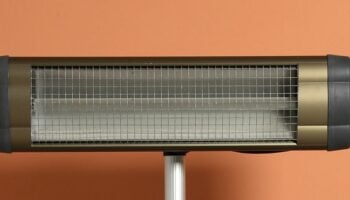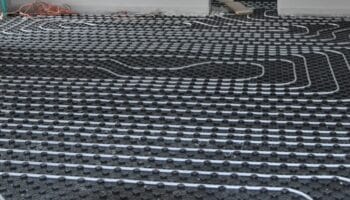We've independently reviewed this article to make sure it's as accurate as we can make it.
To find out more about our article creation and review process, check out our editorial guidelines.
Ouch! Is the floor beneath your feet a bit too warm? To find out why your underfloor heating is getting a little too hot for comfort, check out what’s coming up next in this article.
Your floor heating might be getting too hot because:
- The boiler needs resetting
- The water is too hot
- The floor temperature sensor is faulty
- The radiant heat is trapped
- There was a design fault
- There is a fault in the electrical wiring
We all love a toasty warm floor to step on in the winter months. But we want to feel toasty, not toasted. Take a look at why your floor is overheating and what you should do about it coming up next.
6 Reasons Why Your Floor Heating Is Getting Too Hot
When the weather gets colder outside and the nights draw in, it’s time to wack on one of our favorite and coziest home features – underfloor heating. But what if your underfloor heating is getting a little too warm? Is the floor of your home starting to remind you of the hot coals of a furnace? Then something is definitely wrong.
Coming up next in this article, we are going to look at 6 reasons why underfloor heating overheats. We will also check out a couple of DIY fixes that will help you to remedy the problem. Let’s jump straight to it.
These tips broadly cover both electric and hot water based floor heating.
Reason #1 The Boiler Needs Resetting
Your boiler needs to supply your underfloor heating with water that is between 35 and 55 degrees Celsius. This is the best range for comfort for most types of flooring. But if your floor feels too hot, the boiler might need a reset.
You can reset your boiler by turning the underfloor heating system on and off again. If the problem persists, you will need to have the boiler serviced.
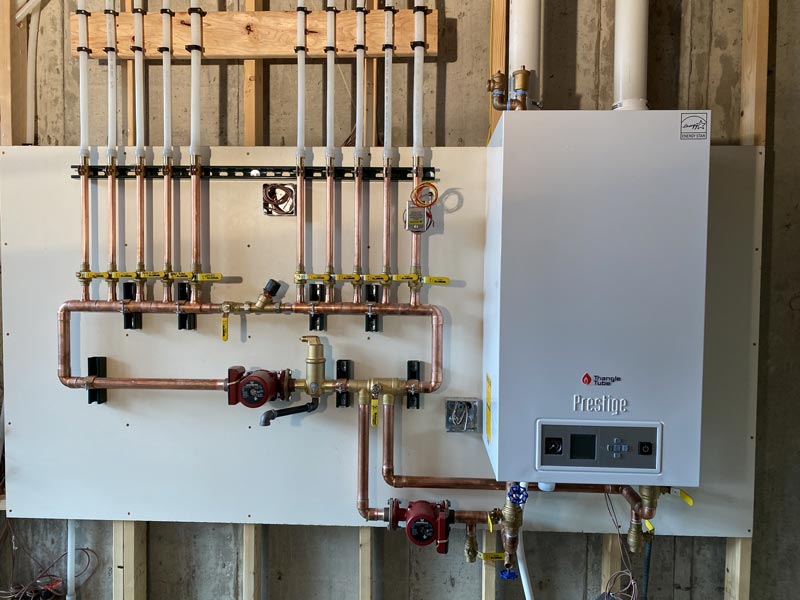
Reason #2 The Water Is Too Hot
Is the floor under your feet uncomfortably hot? Then your boiler could be to blame. Your boiler pumps warm water around your underfloor heating system. But the temperature of the water should only be between 35 and 55 degrees Celcius. This temperature keeps your floor warm but comfortable.
If your boiler is pumping water that is too hot around your underfloor heating, it will need servicing. Your boiler might need a mixing valve to reduce the temperature of the water.
To pinpoint the problem, you should contact a plumber or your local HVAC specialist. They will be able to service your boiler and see what the problem is. To keep your boiler in the best working condition, you should have it serviced regularly. Most HVAC specialists recommend that you do this every 12 months.
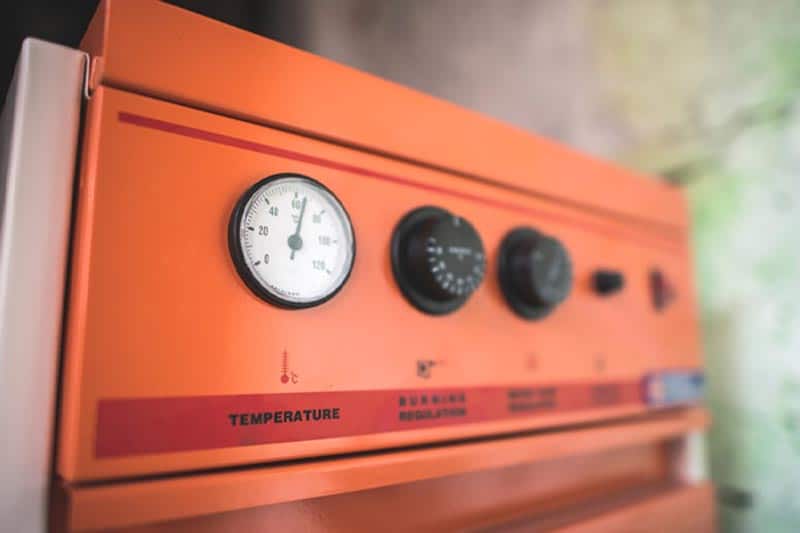
Reason #3 The Floor Temperature Sensor Is Faulty
What temperature is your underfloor heating set at? Perhaps you have tried turning the thermostat down but the floor is still too hot. If the only way to relieve the system is to turn it off, something is definitely wrong.
Every underfloor heating system is installed with a floor temperature sensor. This sensor prevents the floor from overheating and keeps it warm in the winter. You can normally find the temperature sensor between half a meter and 1.2 meters from the base of the wall under the thermostat.
The floor temperature sensor should stop your floor from getting too hot. But what if yours does get too hot? Then it is likely that the floor temperature sensor is faulty. Unfortunately, this is not an easy fix. You will need to call an HVAC technician to have a look at the sensor so they can repair, or possibly replace it.
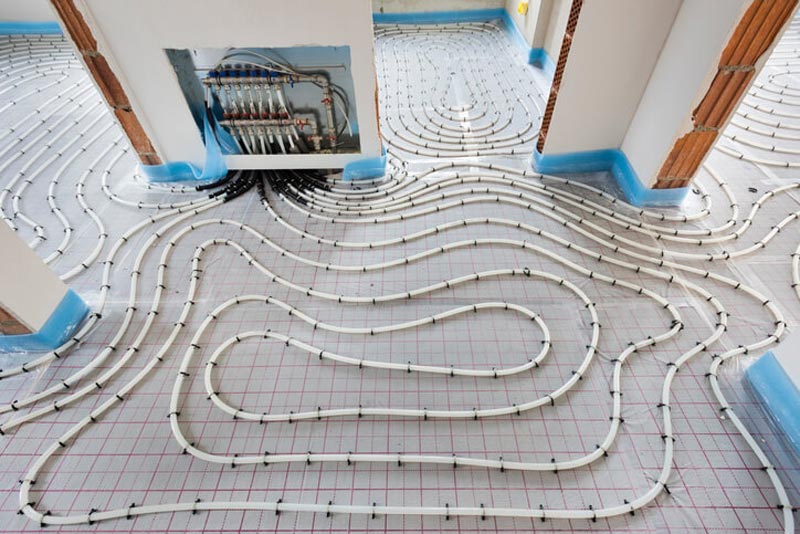
Reason #4 The Radiant Heat Is Trapped
Radiant heat in underfloor heating tries to release warmth evenly across your floor. But one of the things that can spook the system and cause it to act out is newly installed heavy objects on the floor.
If a heavy object is covering a large portion of the floor, this might cause the system to overheat. This is because the heat in that portion of the floor will be trapped and unable to dissipate.
To fix this problem, you will need to remove the large object from the floor. The problem should then subside. If it continues, you will need to contact your HVAC technicians so that they can reset the radiant heat sensors.
Reason #5 There Was a Design Fault
Your underfloor heating should be at a comfortable temperature for you to walk on with or without socks on. If the flooring was laid in the middle of winter, you may not have noticed straight away that was actually too hot. This may have only become apparent to you as the weather got warmer.
Has your floor heating been giving you problems since its installation or since the weather has gotten warmer? Then there may have been a problem with the original design of the floor. The spacing of the pipelines might be too close together. The type of flooring might conduct too much heat for the position of the pipelines.
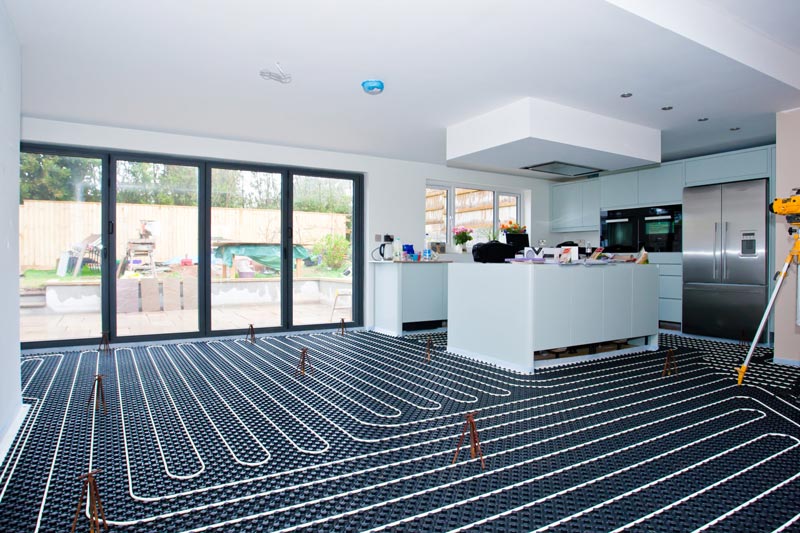
If there was a design fault in your underfloor heating, you will need to call your HVAC specialists. They will need to analyze the problem and then rectify it. Perhaps they will have to change your flooring or even redo the piping. So, with that in mind, which kind of flooring is the best for radiant heating?
Here are the top 4 options:
- Porcelain tiles
- Ceramic tiles
- Natural stone tiles
- Laminate
These types of flooring are best for radiant heating because they are good thermal conductors. This allows the warmth to flow easily into the room. These materials are also thin, so your system will not need to use as much time or energy to heat the floor. Some natural materials like wood contract and expand as temperatures alter. The materials listed above, however, will not.
Now, no one wants to even imagine the possibility of a leak in their underfloor heating. But it is also good to be prepared. The advantage of the materials listed above is that they will not suffer water damage if there is a leak in your heating system. They are also highly resistant to cracks.
Reading #6 Missing Check Valve
A missing check valve within the system or have gone bad. This would cause a continuous movement of hot water in the overheated space, and essentially be like not being able to turn off a heater.
If this is your issue, I recommend switching off the power completely via the circuit breaker. Give it 10-20 minutes to reset, and see if it returns to overheating when turned back on.
If so, this could be a trickier problem to sort – one best handled by a professional.
Reason #7 There Is a Fault In the Electrical Wiring
Regardless of whether your underfloor heating system has water pumps or electrical heating, it could face an electrical issue. If the floor under your feet is too hot for comfort, this could be a sign of an electrical wiring fault. There are a couple of things that could be to blame.
Here are some of them:
- The thermostat is faulty
- There is a fault in the electrical wiring
- The floor sensor has failed
When electrical faults appear in your underfloor heating system it is best to turn it off completely. You should avoid using it until you can call an electrician and have them take a look at it.
It’s worth noting that a short typically causes a heating system to underheat, not overheat.
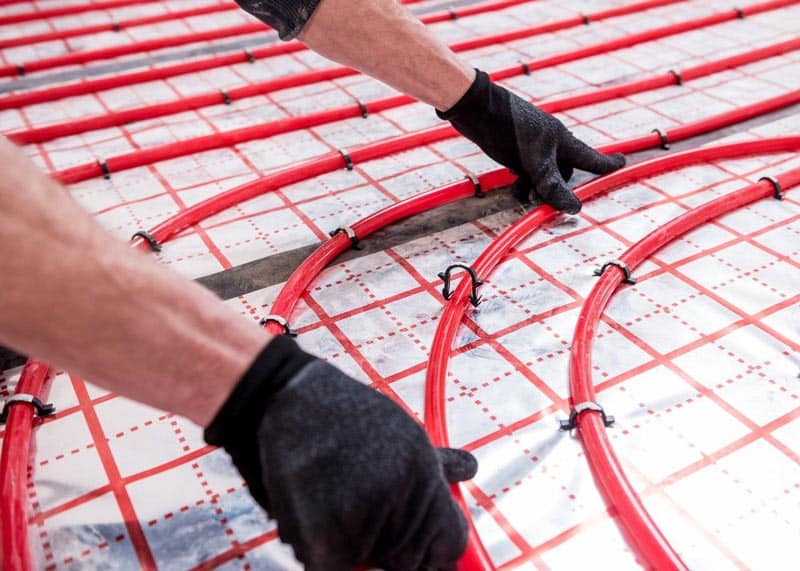
Conclusion
We all like a cozy warm floor beneath our feet during the cold months, but is your floor a little too hot? In this article, I have mentioned 6 reasons why your floor heating could be getting too hot. I’m sure this information has helped you to work out the problem with your floor and has you on the road to fixing it.
If this article has helped you, please consider supporting us by checking out some more of our free guides or signing up to our e-mail list.
Thanks for reading, and have a great day!
Cheers,
Craig





